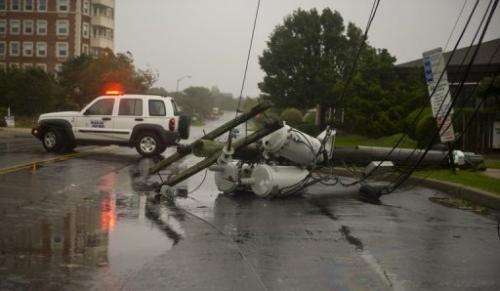'Third World' power outages plague US homes, firms

The United States is the biggest economy in the world, but all it takes to put the lights out here is some snow, or wind, or rain, or squirrels, even a prison break-out.
Power outages -- like one in late October that left two million people without electricity in the northeast, in some cases for several days, after an unseasonably early snowstorm -- are a fact of life for many Americans.
"Is Connecticut a Third World country?" asked a contributor to Newton Patch, a community website in neighboring Massachusetts, frustrated by the indefinite loss of electricity.
"No power, no water... Please know people are suffering and it is hard to understand when this is the United States, why we cannot solve this problem in a timely manner."
For American homes, losing electricity is more than being in the dark.
Heating -- or air conditioning in the summer -- stops. Food thaws in freezers. Schools are closed. Even the roads become hazardous when the traffic lights go on the blink.
In the worst cases, families must sleep in generator-powered evacuation centers and workers temporarily lose their jobs.
Many Americans say they've had enough, sometimes with a sense of humor.
"Recalling my 'Little House on the Prairie' emergency survival training, I immediately cleared out the fridge and freezer and buried the food in coolers out back in the snow," wrote syndicated columnist Tracy Beckerman on her Lost in Suburbia blog.
"Then we moved a ton of firewood into the house, gathered up candles, flashlights, and extra blankets and relocated everyone into the living room where we would hunker down in front of the fireplace until we got power back."
She added: "Yes, I am one of the many, the proud, the powerless."
Snowstorms are frequent in Connecticut, but rarely in October, said Al Lara, spokesman for Connecticut Light and Power, half of whose 1.2 million customers were still without power on Tuesday, two days after a storm hit.
"Usually we have this kind of bad weather in the winter, after the leaves have fallen," he told AFP.
"But in Saturday's storm, we received as much as two feet (61 centimeters) of snow and a lot of heavy rain and ice on top of trees that were completely full of green leaves," he said.
Such trees are prone to fall on power lines, which in much of the United States are not buried under ground, but strung above ground along wooden poles, exposed to the elements.
On such power lines, ice can accumulate. Winds can break off branches. Rain can weaken the ground in which the poles are planted. Lightning strikes. Cars go off the road and hit a utility pole.
In an annual report, Eaton, a multinational power management company, said power outages affected 17.5 million people in all 50 states last year when there were 3,419 separate power outages, up from 2,840 the year before.
The average blackout lasted four hours, but together all the outages added up to 156 days. California had the most incidents by far (508) followed by New York (176) and Texas (145).
Bad weather was responsible for one in four outages, and faulty equipment or human error caused one in eight incidents.
Others were blamed on motor vehicle accidents, vandalism, a runway foil-coated Barbie balloon, and a veritable menagerie of animals -- most often squirrels, two beavers, four snakes and a bobcat that climbed a utility pole in Oklahoma and touched two power lines simultaneously.
"The bobcat did not survive," the Eaton report said.
Then there was the inmate in Tennessee: "A Carter County jail prisoner caused a power outage during an alleged escape attempt when he was crawling in a space above the ceiling and touched some wires," the report said.
Writing on the website of the USA Today newspaper, a contributor named Sharpteeth asked: "These outages are annual, different places and sometimes similar places. How about moving the utility grid underground?"
Blogging from New Jersey, Joseph Weber said: "I have never understood why the power utilities are not required, over time, to put their wires underground."
He added: "If they devoted 5 percent of their construction budget to this end each year, we would be rid of this problem. We know it can be done."
But at Connecticut Light and Power, Lara said it would be too expensive to bury all powerlines. "They may fail as frequently but when they do fail, they take much longer to restore."
"It is more difficult to detect where the fault is. With a line (overhead), you can simply look up and see."
(c) 2011 AFP





















